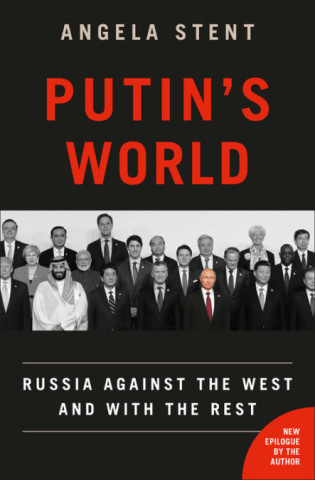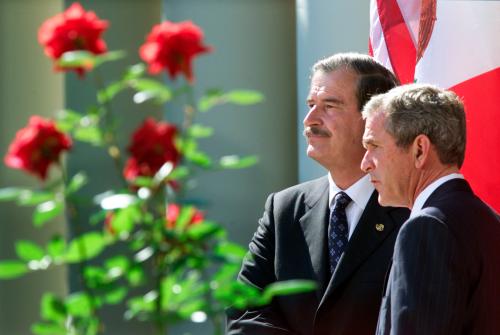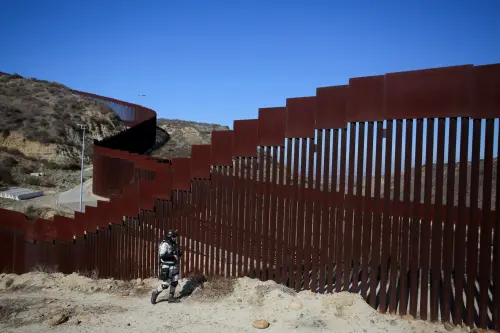Since the early days of Russia’s premeditated and unjustified invasion of Ukraine, Mexico has been raising eyebrows and opening question marks in Washington as well as in the capitals of other nations determined to push back on Vladimir Putin’s war of aggression.
At first blush, it would seem that some in Mexico, unwittingly or wittingly, seem intent on opening a “second front” for Moscow from there. President Andrés Manuel López Obrador’s misguided bromides regarding Mexico’s so-called “neutrality,” “non-intervention,” and “the need to get along with all nations”; repeated criticism of U.S. and European Union aid to Ukraine (when lashing out against what he perceives as their “meddling” in Mexico’s domestic affairs); and refusing to present a common North American front with Canada and the United States regarding sanctions — even if largely symbolic — are deeply troubling. Kyiv’s ambassador to Mexico has publicly and continuously reiterated her request for full-fledged Mexican support for the Ukrainian government and people, to no avail.
Now, with the president’s MORENA party and its allies in the lower house of Congress having unconscionably launched in late March a Mexico-Russia friendship caucus — inviting Moscow’s ambassador and providing him with a bully pulpit to disseminate lies and disinformation — Mexico is blindly playing with fire. López Obrador apparently believes he can have his cake and it eat too when it comes to ties with the United States and the EU, the United States-Mexico-Canada Agreement (USMCA) framework, and Mexico’s global and multilateral diplomatic footprint. Moreover, recent statements to the U.S. Senate by USNORTHCOM’s commander in chief, General Glen VanHerck, that Mexico is host to the largest number of GRU operatives in the world, should be a red flag and an issue of profound concern in terms of the need for the three North American partners to ensure common domain awareness. Unsurprisingly, reactions to all of this in the U.S. have ranged from dismay to profound concern and anger, and members of Congress have now started to respond, including a demand to yank the visas of Mexican legislators who supported and participated in the establishment of the caucus. Mexico also abstained in the April 7 United Nations General Assembly vote to suspend Russia from the U.N. Human Rights Council, after López Obrador had publicly stated that same morning that he would not support the resolution.
Thankfully, the Mexican foreign ministry has been pushing back against much of this and has forced the president to at least recalibrate his positions and initial statements. From its perch as a non-permanent member of the U.N. Security Council, Mexico has condemned the invasion and subsequently voted both in the Security Council and in the General Assembly in favor of resolutions condemning Moscow’s actions. Moreover, Mexico’s permanent representative to the U.N. has also called out the attacks against the civilian population being committed by Russian troops in Ukraine.
Drivers of the friendly approach to Russia
Nonetheless, what has been happening in Mexico City’s National Palace since the invasion started on February 24 is at best disingenuous and reveals López Obrador and MORENA’s utter contempt for foreign policy matters and their outdated and tone-deaf vision of world affairs, harking back to the days of the Non-Aligned Movement in the 1970s when López Obrador cut his teeth as a politician in the Institutional Revolutionary Party (PRI). Despite an invitation personally conveyed to him over the phone by Canadian Prime Minister Justin Trudeau, the president declined to participate in a virtual meeting with Trudeau and European Commission President Ursula von der Leyen to raise funds for Ukrainian refugees and internally displaced people. At worst, López Obrador may truly believe in payback for Moscow for its vaccine diplomacy and Mexico’s ability to access Sputnik jabs early on in the COVID-19 pandemic, which also likely explains why he had originally invited Putin (the Russian leader declined), along with Cuba’s president (who did travel to Mexico City), to attend Mexico’s Independence Day celebrations last year — in a historical first in that foreign leaders had never before been invited to the ceremonies and military parade. It’s also not surprising that Putin has frequently attempted to draw false equivalences between deployment of NATO military assets in eastern Europe including nations that border Russia and toying around with the scenario of how the U.S. would react in the event that Russian military personnel or missiles were to be deployed in Mexico.
What’s behind all of this? Given that Mexico trades in two days with the United States what it trades in a whole year with Russia, ideology seems to be paramount. The traditional left in Mexico — and throughout Latin America in general — tend to support policies that push back against “Western imperialism” but is also skeptical of liberalism and what it perceives as its institutions and stakeholders, which — like many authoritarian regimes — it considers to be tools of Western values and hegemony. It should therefore come as no surprise that the Mexican left is inclined to swallow and regurgitate Russian disinformation and propaganda (“NATO aggression,” “denazification of Ukraine”), see sanctions as another form of “imperialism” and an attempt to corner Russia, and resort to RT and Sputnik as sources of valid information. Unsurprisingly, conflation of Wall Street, the U.S. media, George Soros, liberalism, and “universal values” is also a recurrent trope. That means that they are also inclined to support authoritarian, anti-liberal figures like Putin, or Donald Trump. Since 2018, there has been a proverbial, and perturbing, alignment of strange bedfellows in Mexico, with López Obrador supporters having in turn become fervent Trump supporters and now justifying Russia’s invasion and its actions on Ukrainian territory. Pro-government newspaper La Jornada (one the few traditional media outlets in Mexico that receives generous economic support from the government) has even become in recent days a shill and mouthpiece for Russia’s attempts to sow doubts regarding war crimes committed by Russian troops in and around the Kyiv suburb of Bucha.
Over the years, a combination of navel-gazing and lack of purpose, ambition, budget, and overarching grand strategy have all meant that when it comes to global or even hemispheric affairs, Mexico’s diplomatic payload tends to be woefully puny, particularly compared with other emerging economies and regional powers. Now, with López Obrador’s disdain for foreign policy and his general austerity drive eviscerating Mexico’s foreign service corps and its footprint abroad, the nation is punching even further below its weight in global affairs. Not even the best-funded diplomacy could make up for decisionmaking like López Obrador’s. But the weakening of the diplomatic apparatus certainly is part and parcel to the president’s complete lack of interest, intellectual curiosity, and engagement with world affairs and his simplistic and unstatesmanlike stance regarding his country’s interests abroad.
Implications for ties between Mexico City and Washington
To add insult to injury, López Obrador’s reticence to “to call a fig a fig and a trough a trough” when it comes to international aggression and the violation of international law and norms, along with his dillydallying and his outright rejection of supporting sanctions against Moscow, means that when it comes to geopolitics and upholding international order, Mexico will continue to be no more than a strategic afterthought in Washington and other key capitals around the world.
At the end of the day, having Mexico fully join in with Western economic and financial sanctions — for example, ensuring that Russian oligarchs on sanctions lists do not have moored yachts or real estate in Mexican resorts — would not fundamentally alter what’s at stake for Russia or shape Moscow’s next steps in the conflict. It is more about the message it would send about how Mexican diplomacy will help underpin a rules-based international system — as it has rightly and successfully done in the past — and greater foreign policy cohesion and convergence in building a common North American footprint. And what it would no doubt do is rob Putin both of further opportunities to gain a foothold in Latin America — a familiar strategy for Russia this last decade — and of a useful propaganda tool by undermining arguments like that of Viktor Koronelli, Russia’s ambassador to Mexico, who said during the recent launching of the Mexico-Russia friendship caucus that “Mexico will never join anti-Russian sanctions” and that “across the world, there are countries like China, like India, like Mexico, that will never say ‘Yes, Sir’ to Uncle Sam’s orders.”
At a time when multiple fronts of bilateral contention exist and when López Obrador has openly criticized U.S. Secretary of State Antony Blinken and called U.S. senators liars for raising concerns about attacks against journalists and the weaponization of the judiciary in Mexico, the end result of a Mexican turn away from the flirtation with Putin’s wartime Russia could be further progress towards an interdependent, synergistic, and forward-leaning bilateral relationship between Mexico and the United States. Mexico is once again the United States’ number one trading partner. With a wiser approach to foreign policy, it might finally also become Washington’s key strategic partner of choice in the Americas.
The Brookings Institution is committed to quality, independence, and impact.
We are supported by a diverse array of funders. In line with our values and policies, each Brookings publication represents the sole views of its author(s).









Commentary
López Obrador’s flirtation with Russia risks worsening US-Mexican relations
April 11, 2022